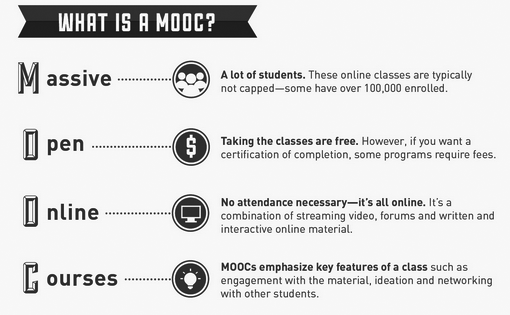This semester, McGill joined the ranks of MIT, Harvard, and other leading universities with the opening of registration for its first ever Massive Open Online Course (MOOC) Chem181x. The course, known as “Food for Thought,” will be offered by professors David Harpp, Joe Schwarcz, and Ariel Fenster starting this January and lasting 13 weeks.
MOOCs, founded by the company edX, were designed with the purpose of expanding access of high quality education online. The instalment of Chem181x brings a brand new approach to education within McGill’s learning sphere, as MOOCs are not offered for credit, but rather to foster knowledge for the sake of learning. They are free to anyone around the world who is interested in receiving an education from these prestigious universities.
While students cannot obtain a degree from enrolling in MOOCs, they may receive a certificate of completion depending on their participation in the course. This is measured via various methods, including online discussion boards. Students have the option to “audit a course,” meaning they have access to all the course material and online discussion forum without necessarily attending every lecture. For those who are interested in greater commitment, they can choose to complete the course in its entirety to achieve different types of honour code certificates. Either way, the flexibility of MOOCs remains one of their largest appeals—with a virtual classroom that is open night and day, students can study on their own schedule and at their own paces.
Harpp has been heavily invested in making this project happen at McGill. According to him, McGill chose to get involved in edX, “partly to see if we could work up a better version of existing visuals and presentations [of our courses in] a more engaging format.”
According to Harpp, professors were also interested in learning how people from around the world would respond to their approach to teaching.
Digital teaching is not new to McGill. “We were already fairly knowledgeable about how digitally recorded lectures were received, because we invented the McGill recording system with programmers way back in 2000,” said Harpp.
Today, McGill offers around 350 recorded courses each year. With experience and positive feedback received over the past 13 years, Harpp said he felt McGill was ready to enter the realm of virtual teaching on a global scale, as well as keeping [McGill’s] ‘brand’ alive by maintaining pace with other top-quality universities.
According to Harpp, the process of joining edX was filled with negotiation between high academic officials of McGill and edX management. He jokingly ascribed the process as similar to speed dating, where different representatives from Harvard and MIT came to meet with numerous members of McGill’s faculty, deans, and a variety of instructors, until McGill was asked to join edX. After cautious deliberation, Provost Anthony Masi and Laura Winer, head of the Teaching and Learning Services agreed that McGill would participate in the project.
Similar to the popular World of Chemistry series offered by the same professors on campus, CHEM181x is designed to offer a scientific framework for understanding food and its impact on health and society from past to present.
“One thing we hope to portray is that science can partially answer quite a few questions but that there is no magic menu for managing one’s life,” said Harpp. “We want to portray what the science is telling us and to hope that most of the viewers will be vigilant about charlatans and to develop some good level of critical thinking.”
Harpp foresees the virtual environment as one where different points of view will come into play due to the broad audience. This, he hopes, will help engage groups of students to do local research on food and food services and share those experiences among each other.
“This may not transpire but we are open to ideas as to how we might better deliver our course,” he said.
Given the nature of these online courses, a significant amount of preparation goes into the instalment of such a class. According to Harpp, it takes a full week of work to go into the production of an hour of this online class.
“Editors, our designer, helpers and the lecturer have collectively put in a total of [over 30 hours of work] for a one hour segment,” said Harpp. A focus group of about 20 people has also been involved in this project in order to provide constructive feedback.
Due to the resources required and the variety of people involved in the development of such a course, the costs for producing a MOOC are higher than those associated with a standard course.
“We have obtained a significant donation from interested parties [to help offset these costs],” Harpp said. Although funds are available to relieve professors involved in the MOOC of their usual teaching hours, the McGill professors participating in the MOOC project have chosen to continue teaching their usual courses without changes.
McGill hopes to offer more MOOC courses as time goes on. “Natural Disasters,” taught by Professors John Stix and John Gyakum, is poised to make an entrance to the world of edX later in 2014. Courses from other faculties, such as Management, have been proposed as well.
“This is the end product of our involvement with lecture-capture,” said Harpp. “It is a natural evolution and also [is] not easy. If [this] were easy to do and deliver in a simple but effective way, it would have happened years ago. It is a worthy challenge to see if we can make a course […] even better—not only for local consumption but for delivery to civilians in diverse locations”.
For more information or to register for edX courses, visit www.edx.org.








